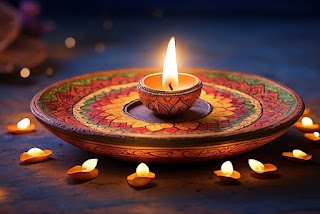By Arul Shankar
Diwali, also known as Deepavali, is one of the most widely celebrated festivals in India. It holds immense cultural and religious significance for Hindus. The festival of Diwali, often referred to as the "Festival of Lights," is a joyous occasion that brings families and communities together. In this article, we will delve into the rich traditions, customs, and celebrations that surround Diwali.
What is Diwali?
The Festival of Lights
Diwali, a Sanskrit word meaning "row of lights," is a five-day festival that marks the victory of light over darkness and good over evil. It symbolizes the triumph of knowledge over ignorance. During Diwali, homes, temples, and public places are illuminated with oil lamps, candles, and colorful electric lights. The light is believed to guide Lord Rama, his wife Sita, and his loyal brother Lakshmana, who returned to their kingdom of Ayodhya after defeating the demon king Ravana.
Significance of Diwali
Diwali is celebrated for various reasons across India. In the north, it is associated with the return of Lord Rama to Ayodhya. In the south, it commemorates the defeat of the demon Narakasura by Lord Krishna. The Jain community celebrates Diwali as the day Lord Mahavira attained nirvana. Sikhs observe Diwali to mark the release of Guru Hargobind Ji from imprisonment.
Diwali Date and Duration
Diwali typically falls in October or November, depending on the Hindu lunar calendar. It begins with Dhanteras, followed by Naraka Chaturdashi (Choti Diwali), Diwali, Govardhan Puja, and Bhai Dooj. The main Diwali day is celebrated on the third day, and it is a national holiday in India.
Diwali Preparations
Cleaning and Decoration
Homes are thoroughly cleaned and adorned with colorful rangoli (artistic floor designs) to welcome Goddess Lakshmi, the deity of wealth and prosperity. It is believed that she visits the cleanest and most beautifully decorated homes.
Shopping for New Clothes and Gifts
People buy new clothes, jewelry, and gifts for family and friends. It is considered auspicious to start the new year with new possessions.
Rituals and Traditions
Lighting Diyas and Candles
The lighting of earthen lamps (diyas) and candles is a central tradition of Diwali. It is believed to ward off evil spirits and illuminate one's life with knowledge and wisdom.
Offering Prayers and Sweets
Families gather for prayers and offer sweets and special dishes to deities. Temples are adorned with flowers and lamps, and special pujas (prayers) are conducted.
Delicious Diwali Delicacies
Sweets and Savories
Diwali is incomplete without a variety of sweets like ladoos, jalebi, and barfi. Savories like samosas and pakoras are also prepared in abundance.
Special Dishes Prepared
Families prepare special dishes, often unique to their region, to celebrate the festival. These mouthwatering delicacies vary across India.
Fireworks and Crackers
Fireworks and firecrackers light up the night sky during Diwali. While they add to the grandeur of the celebration, concerns about air pollution and noise pollution have led to calls for eco-friendly celebrations.
The Mythological Significance of Diwali
Ramayana and Lord Rama's Return
The epic of Ramayana narrates the return of Lord Rama to Ayodhya after 14 years of exile and his victory over Ravana. Diwali is celebrated to honor his homecoming.
Regional Celebrations
North India
In North India, Diwali is celebrated with grandeur, and the festival is often associated with the worship of Goddess Lakshmi and Lord Ganesha.
South India
In South India, the festival is marked by the lighting of oil lamps and bursting of firecrackers.
East India
In Bengal, Diwali coincides with Kali Puja, dedicated to the fierce goddess Kali.
West India
In the state of Gujarat, Diwali is celebrated with enthusiasm, with communities organizing grand garba and dandiya events.
Diwali as a National Festival
Diwali transcends regional and cultural boundaries to become a national festival celebrated by people of all backgrounds. It unites the diverse Indian population.
The Social Aspect of Diwali
Family Reunions
Diwali is a time for family gatherings and reunions. It is a special occasion for bonding with loved ones.
Gifting and Exchanging Wishes
Exchanging gifts and warm wishes are an essential part of Diwali, symbolizing love and goodwill.
Eco-Friendly Diwali
Pollution Concerns
The excessive use of fireworks has raised concerns about pollution, leading to a growing awareness of the need for eco-friendly celebrations.
Alternatives to Firecrackers
Many people are opting for noise-free and environmentally friendly alternatives to traditional firecrackers.
Diwali in Modern Times
Diwali in the Digital Age
In modern times, technology has added a new dimension to Diwali celebrations, with virtual gatherings and e-gifting becoming popular.
Corporate Celebrations
Businesses and corporations also celebrate Diwali with great enthusiasm, with offices and workplaces decorated, and employees exchanging gifts.
Diwali, the Festival of Lights, is a time of joy, togetherness, and spiritual renewal. It brings people of all backgrounds together in the spirit of unity and love. As the glow of diyas lights up our homes, may it also light up our hearts with happiness and prosperity.
Frequently Asked Questions (FAQs)
What is the history behind Diwali? Diwali has various historical and mythological significances, including the return of Lord Rama, Lord Krishna's victory, and Lord Mahavira's nirvana.
How do people celebrate Diwali in different regions of India? Diwali celebrations vary across India, with different traditions and rituals in the North, South, East, and West.
What are the eco-friendly alternatives to firecrackers during Diwali? Eco-friendly options include using noise-free fireworks, LED lights, and celebrating with diyas and candles.
How has technology impacted Diwali celebrations in modern times? Technology has led to virtual celebrations, e-gifting, and increased connectivity among family and friends during Diwali.
Why is Diwali celebrated by people of different religions in India? Diwali's universal message of light, goodness, and unity attracts people from diverse religious backgrounds, making it a national celebration.





.gif)

.png)
.png)



.png)
.png)
.png)

Comments
Post a Comment
Share your response